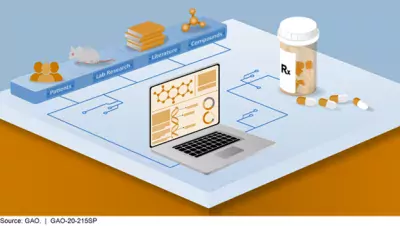Don’t Fear Artificial Intelligence, Plan for It
By Timothy Persons, GAO’s Chief Scientist and Managing Director of GAO’s Science, Technology Assessment, and Analytics team.
Since the 1968 release of the film, 2001: A Space Odyssey, artificial intelligence (AI) has captured our imagination, inspiring both wonder and fear. Chief among those fears? That computers like “HAL” will take control of our lives and eventually replace us.
But this fear obscures the fact that AI does not replace, as much as it augments, human intelligence. With proper oversight in place, AI can be harnessed to drive innovation and competitiveness.
How is AI being used?
Perhaps the best example of how AI is spurring growth is in the health care field. There is a global push to develop vaccines and therapeutics to save lives and end the COVID-19 pandemic such as Operation Warp Speed, a vaccine development program which we are reviewing on a periodic and ongoing basis. In a report issued earlier this year, we found that AI can be used to decrease the time and cost required to bring new drugs to market, a process which traditionally takes 10 to 15 years.
Machine learning, a field of AI in which software learns from data to perform a task, is already being used in the early stages of drug development. It is helping researchers discover new medicines, protect humans in preclinical testing, and improve clinical trial design.
For all its benefits, AI does present new challenges to policymakers—namely, how to ensure that these tools are free of bias and protect consumer privacy. I discussed these considerations in more depth during a healthcare keynote at the 2020 Ai4 conference.
What’s the role of federal oversight?
Data is the lifeblood of AI, and having good data leads to a healthier system and to healthier operations. I explored this idea in my recent podcast with the former Federal Chief Information Officer Suzette Kent.
Policymakers could collaborate with relevant stakeholders to establish uniform standards for data and algorithms. There are costs associated with this approach, including potentially time- and labor-intensive changes, but it is this type of standardization that paves the way to clear, transparent data.
Finally, policymakers could consider the human side of the equation. It is not strictly about getting the algorithm and the machine right. We need to rethink how we are training the next generation to use these technologies. This will be key to reaching beyond what our predecessors could have imagined.
What’s next?
AI is infinitely more complex than narrow cinematic narratives can capture. With ever-expanding capabilities, the onus is on policymakers to ensure that oversight measures are in place to collect quality, standardized data, while also ensuring investment in human capital. This is a topic that we at GAO plan to examine in more detail, both at next month’s Comptroller General Forum on AI Oversight and in the coming years. AI has broad impacts to not only health care, but also the transportation, defense, financial, and energy sectors, among others, as well as the economic and social well-being of all Americans.
Rather than replace human intelligence, as HAL attempted to do, artificial intelligence augments it and can enable us to be better, grander versions of ourselves. We should embrace it.
Related Products

GAO's mission is to provide Congress with fact-based, nonpartisan information that can help improve federal government performance and ensure accountability for the benefit of the American people. GAO launched its WatchBlog in January, 2014, as part of its continuing effort to reach its audiences—Congress and the American people—where they are currently looking for information.
The blog format allows GAO to provide a little more context about its work than it can offer on its other social media platforms. Posts will tie GAO work to current events and the news; show how GAO’s work is affecting agencies or legislation; highlight reports, testimonies, and issue areas where GAO does work; and provide information about GAO itself, among other things.
Please send any feedback on GAO's WatchBlog to blog@gao.gov.




